Originally written in 2007, posted here in response to this great video.
When I was 13, I went with a couple of friends to see Wargames, a movie about a possible, computer-created, nuclear war between the US and the Soviet Union. The movie opens, starkly, with two US Air Force officers sitting in a control room down in a nuclear silo, when the order is given to launch their nukes. Each must turn a key in order to launch the nukes, but the older officer cannot bring himself to do it. The scene ends with the younger officer (apparently) shooting the older officer, because the older officer would not thoughtlessly carry out his orders.
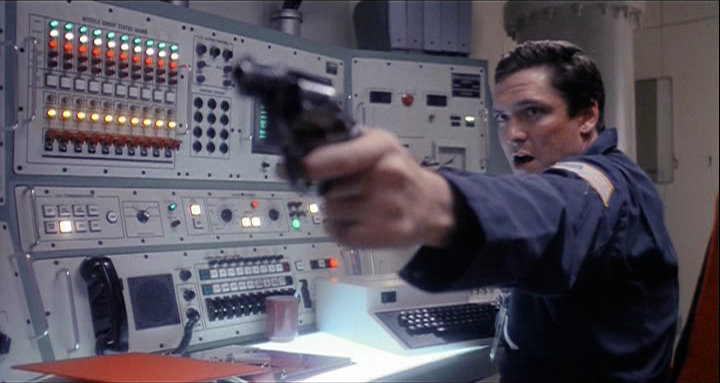
This is a shocking and humorless opening, but a necessary one since the film is ultimately about the threat of global thermonuclear war between two superpowers. It needs an opening like that to hook you. Convince you of the stakes and the seriousness of the matter. When I was 13, this seemed chillingly real. It wasn’t just plausible, it felt inevitable. From between about 1983 to 1987, it seemed obvious to everyone I knew that sooner or later there was going to be a nuclear war between the US and USSR. There was nothing anyone could do about it, so you might as well enjoy yourself.
Children of Men left me, now an adult, with that same awful feeling I got from Wargames. This isn’t merely plausible, it feels inevitable. The difference is; as an adult it takes a much more sophisticated movie to put me in that state.
It comes at the right time. 84 degrees yesterday in L.A. in the middle of winter, and we all talk about global warming and ice caps and the ozone layer with a detached ‘hey, we deserve it’ air of inevitability. Sure, it’s Southern California…but it still gets COLD in wintertime! At least, it used to.
There’s definitely something in the air these days, a cultural zeitgeist about the destruction of the environment. The awful things we’ve done to the Earth and its inhabitants. In the 80s, the news was a constant stream of US/USSR posturing and tensions and small wars conducted by proxy nations. Now the news is a constant stream of animal extinctions, rising temperatures, tsunamis, hurricanes, melting icecaps.
Children of Men effectively feeds on that tension, and presents us with a vision of the future in which something…we never know what…has caused the entire population of the Earth to become infertile. No new humans have been born in 18 years. Did both sexes become infertile? Was it viral? Chemical? What happened? What caused it? We never know.
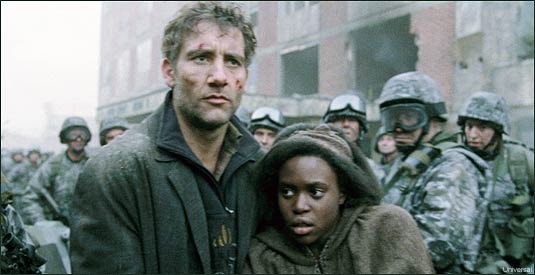
If the movie ever got that specific, it would be easy to dismiss. “Oh, that could never happen.” If someone in the movie started explaining how this gene mutated or that chemical reacted with this environmental factor…the audience would check out. It would cease to be relevant.
Instead we’re left with the aftermath. Wargames imagined that a rogue computer could start World War III all by itself, no humans needed. This was a science-fictional catalyst for what many of us felt was an all-too-real outcome; nuclear war. In Children of Men the science-fiction element–no new children–leads us to an all-too-real result; there is no future for the human race. We extinguish ourselves.
On paper, this seems like it would be hard to do. Nuclear war is a very real and tangible possibility. We actually have thousands of warheads, the Pentagon really does run scenarios about how to fight and win a nuclear conflict. Children of Men’s burden is much heavier because the feeling of environmental breakdown, of the abuse of the Earth and the human race by the human race is much more abstract. Yet this film manages, though an adroit combination of detail in world design and emotional performances from the actors, to convince us that we are among the last generation of human beings to walk the earth.
The detailed future presented in the film is fantastic to see and explore. You’ll want to see this movie more than once. Buy the DVD. Watch the extras. Because they’ve put a phenomenal amount of thought into what the world will look like in just the next 20 years. It’s a kind of low-rent, dystopian, Minority Report. Ads are, of course, pervasive and interactive. But where Minority Report imagined technology would become more useful and amazing and irritating, this film takes its cues more from Brazil. There’s dirt and refuse everywhere.
This movie is like Brazil in other ways. Britain has become a fascist state, full of propaganda. It claims it’s the last nation on Earth, the rest of civilization having collapsed. But can we trust this? Its citizens spy on each other, while the government gives out suicide packets. “Quietus” is the brand name with the great slogan; “You decide when.” The government stages its own bombings, blames all the nation’s problems on the refugees fleeing the plagues and wars in the rest of the world.
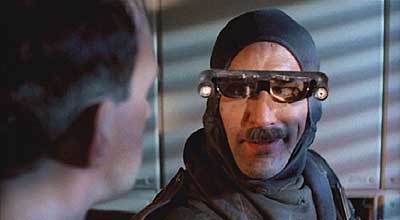
And like Brazil, it’s not without humor. Alfonso Cuarón skillfully breaks the tension with jokes and absurdism and self-awareness. It makes the world and its characters feel that much more real. There’s even a Harry Tuttle figure here, except instead of being a anti-government terrorist who shows up briefly to lighten the mood with his carefree attitude, Syd is a brutal low-level police thug who shows up briefly to lighten the mood with his carefree attitude.
When the movie first opens, we discover the world’s youngest human has just been murdered. He was 18 years old. And the country is wracked with grief. Deliberate references to the death of Princess Diana abound. And instantly, there’s a terrorist attack. There’s constant terrorism in this world, some perpetrated by terrorists, some by the government to keep people afraid of the terrorists.
But our main character, skillfully and nihilistically played by Clive Owen, takes advantage of the grief to get some time off. He doesn’t give a shit, the kid was a wanker. “Ah,” says the sage-like and impish Michael Caine, “but he was the world’s youngest wanker.”
Owen’s performance is note-perfect. He’s Everyman, with no particular virtue except the ability to recognize what’s in front of him. His performance convinces us that things would go on in the face of Armageddon. We’d still go to work. We’d still drink and get stoned. And here, this is the movie’s most subversive comment; we already act like there’s no future. At first blush, Owen’s character seems beaten down by the death of his son, the absence of children, the inevitability of it all. But take a step back, and you realize he could be playing any corporate drone in any movie set in any decade of the last 100 years. We already act like this. Detached.
Michael Caine’s character is a fantastically imagined aging slacker. He’s retreated from the world, but not for any readily apparent political or ideological reason. This is merely how he’s chosen to deal with the end.

Different characters deal with the end in different ways. Owen’s ex-wife became a terrorist, trying to make a difference. His brother holed up in an expensive apartment trying to collect the world’s art before it’s all destroyed. It reminded me of the old couple’s house in A Clockwork Orange. The world outside is going to shit, but in here is quiet and classical music and art. In one of the many humorous moments in the film, the camera sets up a two-shot between Owen and his brother framed with a real life dirigible pig floating outside over Battersea Power Station. Owen’s brother has recreated the cover of Pink Floyd’s Animals in real life. Preserving art for all to see. No coincidence that they chose that album, itself inspired by Orwell’s anti-fascist Animal Farm.
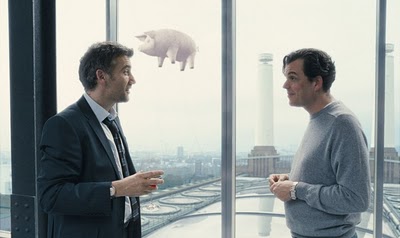
I won’t give away the central plot that moves the action forward. Its shown in a preview and this is, I think, a mistake. It’s much more effective if you don’t see it coming. But the last 20 minutes of the film, as Owen and his companions try to get out of England, is as nail-biting and nerve-wracking as the opening to Saving Private Ryan. The relentless action, combined with what’s at stake, is nauseating. The director deploys CGI tastefully to stitch together several shots to give the illusion of one continuous shot in several scenes, each time ratcheting up the tension as the absence of cuts gives us a feeling of being trapped in the shot, along with the characters. No escape.
Children of Men is a science-fiction masterpiece, not because of any Blade-Runner-like visuals, but because of how effective it is at showing us our own future. It creates a feedback loop, the way the best science fiction does. Like Watchmen in 1986, you feel the tension in our culture rise, and that makes Children of Men seem prescient, and that makes the tension in our culture rise.
Of course, there wasn’t a nuclear war between the US and the Soviet Union. Probably we aren’t among the last generations of humans to walk the Earth. Probably…

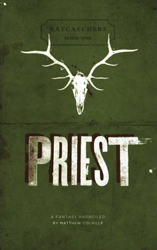 My first novel
My first novel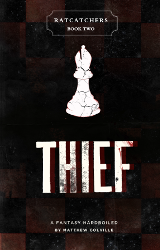 My new novel.
My new novel.